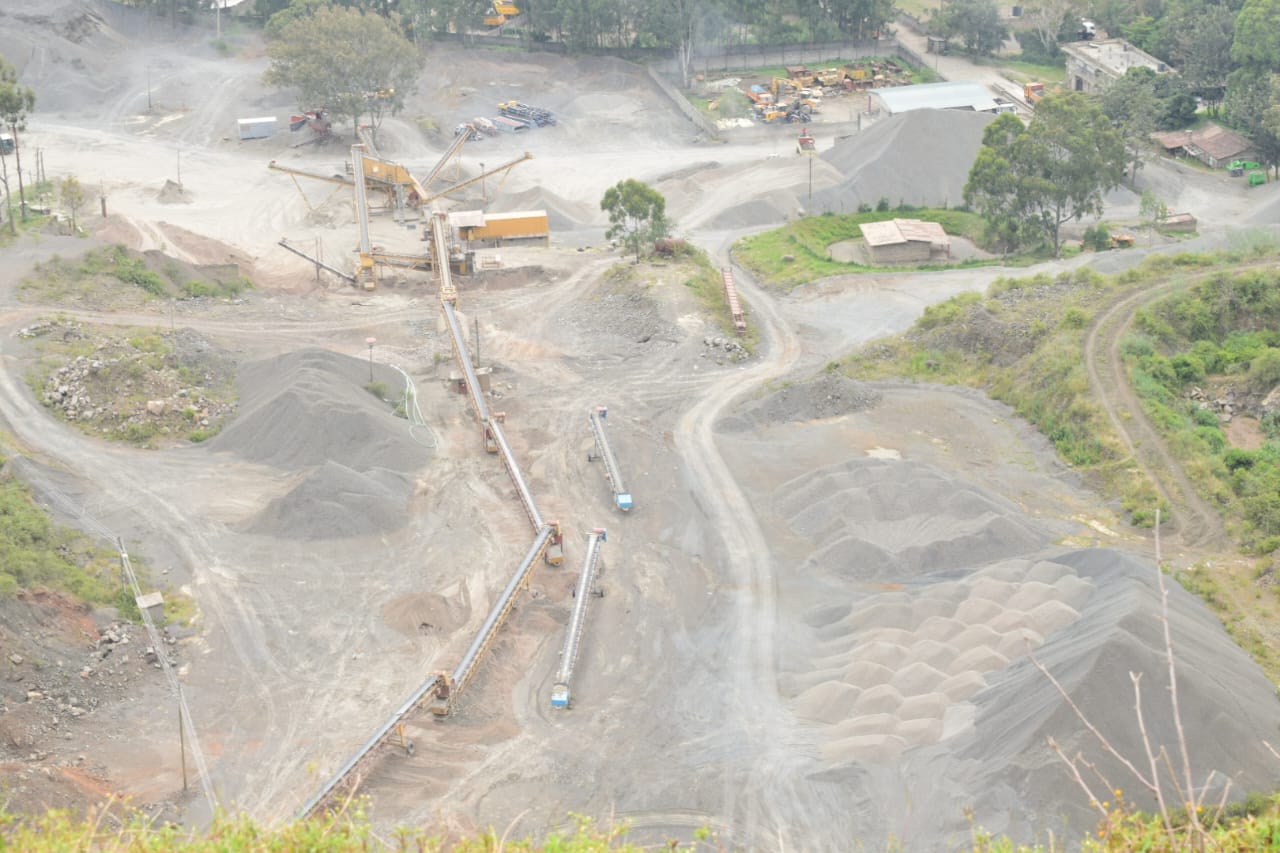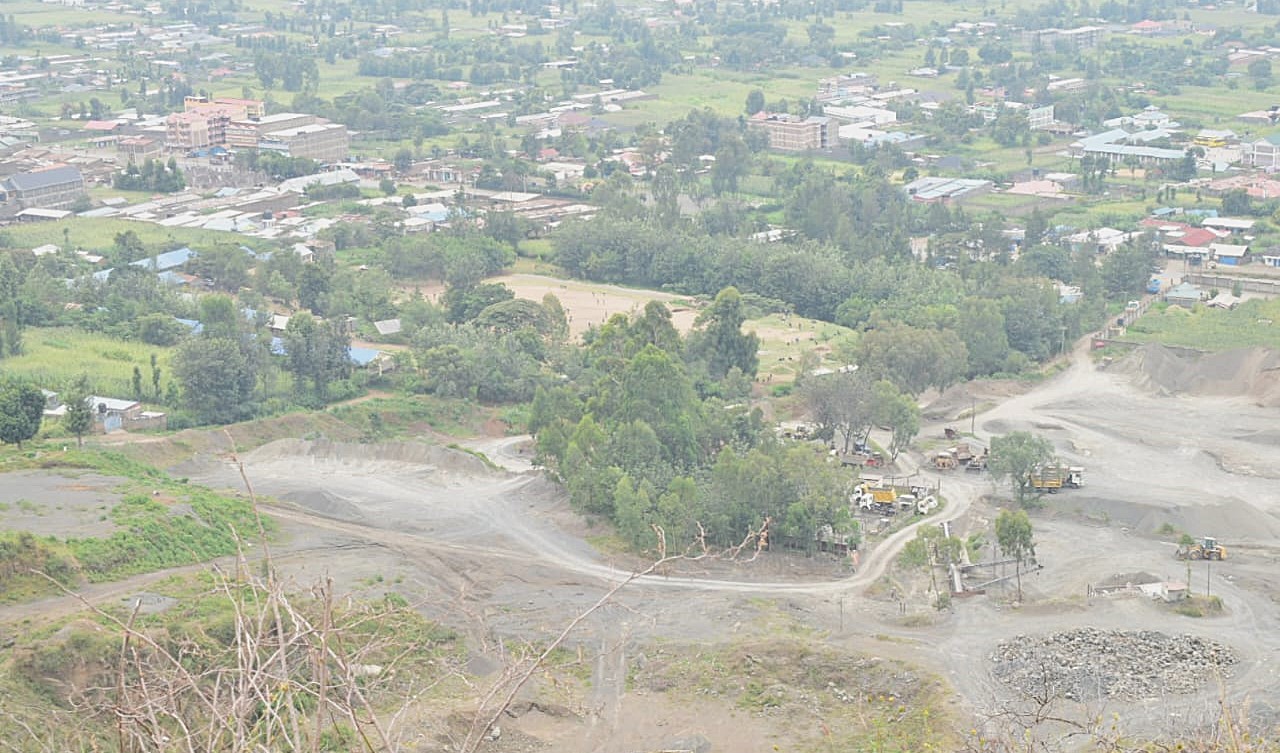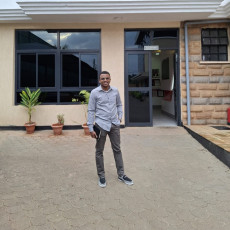- The Breathe Cities program's local sensors are made up of partners Bloomberg Philanthropies, C40 Cities, and Clear Air Fund. It was introduced on September 11, 2024, to enhance public health by lowering air pollution in member cities by 30% by 2030.
It’s a sunny afternoon at Kiamaina constituency in Bahati sub-county, 9km northwest of Nakuru City, donkeys pulling carts with empty jerrycans stream into a nearby Kagoto borehole to fetch water. Some of the loaded donkeys seem to be drained, they walk slowly under the scorching sun as the rider enjoys the trip while seated on the cart.
Along Nakuru- Nyahururu highway is Karsan Ramji and Sons Limited quarry in proximity to a residential area, about 300 meters away is Kagoto Primary School. Several empty lorries get into the quarry and exits fully loaded with ballast.
A few meters from the quarry, is an old wooden and dusty fence, a small wooden gate is wide open, and an elderly woman rests under an avocado tree listening to a radio. It is 55-year-old Virginia Njeri. (not her real name).
Njeri and her husband have lived here for three decades, but 10 years ago, she started experiencing persistent coughing. Local health officials attribute a worrying increase in chest complications cases in the area to a prolonged exposure to dust pollution.
“I live with my husband and children, though they are grown-ups. My entire family has developed the same problem as me,” said Njeri.
Read More
Njeri, who lives next to the quarry, says the operations there have negatively affected both their quality of life and the environment. Their houses have developed cracks on the walls, and land has been degraded by blasting tremors. She is constantly worried about health issues brought about by dust and air pollution.
“When the quarry is blasted, most of the time we run outside because our houses shake as if they can fall. We feel insecure, without peace and comfort in our own houses,” she says.
The situation is so serious that Njeri can no longer harvest like she did before from her farm because quarry activities have degraded the soil resulting in reduced farm yield.

Some years back the government officials visited the area and promised to terminate the quarry operations but it never happened. Now, all the nearby residents have decided to live with the situation.
“We have demonstrated three times, but no one has listened to our plea or taken responsibility for our cracked homes, the quarry owner doesn't care,” Njeri said.
A stone throw away from Njeri’s homestead is 30yrs old John (not his real name) who lives with his parents. He has been ailing from chest congestion and headache for 20 years.
From the hospital documents, John has visited several hospitals and been diagnosed with anxiety and acute bronchitis which has been causing him headaches and chest discomfort.
His body is physically weak, and he says the ailment has robbed his youth since he does not engage in activities like other young people because he stays at home.
“I have been in and out of hospital for so many years. My parents have used a large sum of money to settle my medical bills but unfortunately, my health is still deteriorating," he said.
There is a plan to install air quality monitoring sensors in various locations across Nakuru, including Kagoto, as part of a broader initiative to address air pollution. The sensors will track air pollution levels, providing data to guide actions towards a healthier environment.
The initiative aims to monitor air quality, identify hotspots, and inform strategies to combat pollution, ultimately promoting a cleaner environment and public health.
Through the integration of cutting-edge forecasting technology with community-driven environmental monitoring, the RESPIRA Air Quality Monitoring (RESPIRA-AQM) project seeks to increase Nakuru's resilience against the effects of air pollution and climate change.
According to Alicia Olago, senior programme manager at sensors-AFRICA, Pollution cannot be seen in the air, but the wind carries with it small particles of different kinds depending on the environment.
In order to address the growing issue of air pollution, Respira has installed 20 air sensor monitoring systems in partnership with Nakuru County. These systems combine artificial intelligence, satellite data, and on-the-ground sensors.

The project has placed sensors in predetermined areas chosen in collaboration with community members. Temperature, humidity, and particulate matter are all measured by each sensor. The information is fed into an AI model.
Nakuru City manager Gitau Thabanja lauded Respira on the move to help improve the city to cleaner air. He also calls upon the people of Nakuru to embrace greening of the environment to help in carbon sequestration.
“I wish people could embrace walking rather than using their vehicles, if possible, those who own the vehicles should be serviced regularly to be in good condition,” Gitau said.
Mr. Gitau said to promote Innovative Artificial Intelligence (AI) and data science techniques into air pollution monitoring and forecasting, an air sensor was installed at Nakuru's Meteorological Department for efficient anticipation, assessment, and addressing of air quality concerns.
“We have identified control areas for sensor installation at different places and occupations according to daily activities, like Nyayo garden which is a green space, and wakulima market to find out the activities that contribute more to pollution,” he said.
The Breathe Cities program's local sensors are made up of partners Bloomberg Philanthropies, C40 Cities, and Clear Air Fund. It was introduced on September 11, 2024, to enhance public health by lowering air pollution in member cities by 30% by 2030.
With the help of the Flanders International Climate Action Programme, the Flanders government is funding the project.
.




-1759480422-md.jpg)





-1759480422-sm.jpg)

